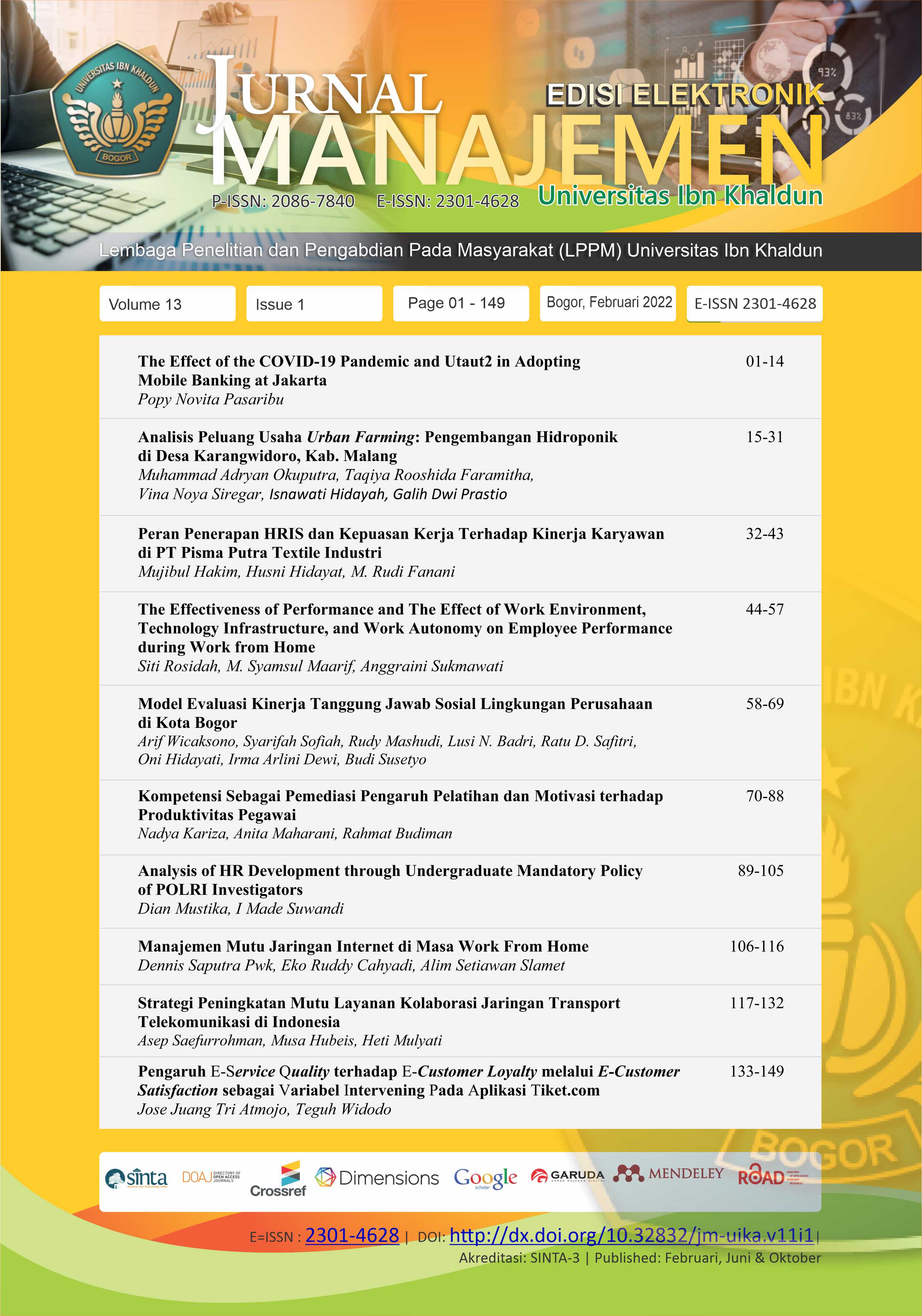Analysis of HR Development Through Undergraduate Mandatory Policy of POLRI Investigators
DOI:
https://doi.org/10.32832/jm-uika.v13i1.6119Abstrak
Basically to build a strong organizational culture takes a long time and gradually, each culture develops written and unwritten expectations about behaviour (rules and norms) that affect members of that culture. However, the organizational culture within the National Police is inseparable from the public's perception and perspective in obtaining information. Therefore, the achievements of Polri's work that have been conveyed to the public so far, both organizational and personal, have contributed to creating a positive or negative framework. In public opinion, it is possible that the ethics and philosophy of Polri as a form of organizational culture are very different from the daily practice of Polri's performance. As the performance of Polri investigators in solving problems, it is always under public scrutiny. As an organization with a clear and systematic hierarchy, PP No. 58 of 2010 concerning Amendment to Government Regulation Number 27 of 1983 concerning Implementation of the Criminal Procedure Code aims to get members of investigators who are able to clearly develop careers who work according to ethics and professionalism so as to improve the performance of investigators in carrying out their duties, functions and authorities. The development of human resources is the basic key to getting competent Polri Investigator personnel. For this reason, the development of competency-based human resources is a compulsory requirement for the National Police Investigating Unit. Thus, the presence of PP No. 58 of 2010 is able to provide more value in services to the community which of course has an impact on positive perceptions in the public.
Referensi
Arianto, Yohannes BN. 2019. Pelatihan dan Pengembangan SDM, Teori & Aplikasi. Jakarta: Unika Atmajaya.
Astawa, I Ketut. 2016. Etika Profesi Polri. Jakarta: STIK-PTIK
Azra, Azyumardi. 2002. Paradigma Baru Pendidikan Nasional Rekonstruksi dan Demokratisasi. Jakarta: Penerbit Buku Kompas.
Baron, R.A. dan Byrne, D. (2005). Psikologi Sosial. Edisi Kesepuluh: Jilid 2. Jakarta: Erlangga.
Dharma, Agus. 1995. Manajemen Prestasi Kerja. Jakarta: Penerbit Erlangga.
Herman, Sofyandi. 2008. Manajemen Sumber Daya Manusia. Yogyakarta: Graha Ilmu.
Hutapea, Parulin, MBA dan Thoha, Dr. Nuriana, MBA. 2008. Kompetensi Plus. Jakarta: PT. Gramedia.
Mangkunegara, A.A Anwar Prabu. 2012. Manajemen Sumber Daya Manusia. Bandung: PT. Remaja Rosdakarya.
Mangkuprawira, Sjafri & Bubeis, Aida Vitayala. 2007. Manajemen Mutu Sumber Daya Manusia. Bogor: Ghalia Indonesia.
Moleong, Lexy J. 2007. Metodologi Penelitian Kualitatif. Edisi Revisi. Bandung: PT Remaja Rosdakarya.
Paine, K.D. 2003. Guidelines for Measuring Trust in Organizations. Journal of The Institute for Public Relations.
Prawirosentono, Suyadi. 2008. Manajemen Sumber Daya Manusia Kebijakan Kinerja Karyawan. Yogyakarta: BPFE UGM.
Pratama, Yosef Ferry. Pengaruh Gaya Kepemimpinan, Kompensasi, Dan Lingkungan Kerja Terhadap Kinerja Karyawan Pada PT. Apatel. Business Management Analysis Journal, Vol. 1 No. 1 Okt 2018.
Putnam, Robert D. 1994. Making Democracy Work. New Jersey: Pinceton University Press.
Rakhmat, Jalaludin. 2007. Psikologi Komunikasi, Bandung: Remaja Rosdakarya.
Shafritz, Jay.M. & E.W.Russell, 1997. Introducing Public Administration. New York, N.Y.: Longman.
Sukmadinata. 2009. Landasan Psikologi dan Proses Pendidikan. Bandung: PT Remaja Rosdakarya.
Sugiyono. 2007. Metode Penelitian Kuantitatif Kualitatif dan R&D. Bandung: Alfabeta.
Thoha, Miftah. 2003. Perilaku Organisasi: Konsep, Dasar dan Aplikasi. Rajawali Press: Jakarta.
Torrington, Hall & Laurta Hall, 1991. Personnel Management: A New Approach. New Jersey: Pretince Hall Publisher.
Walgito, Bimo. 2004. Pengantar Psikologi. Yogyakarta: Andi Offset.
Wibowo. 2011. Manajemen Kinerja. Edisi Ketiga. Jakarta: PT Raja Grafindo Persada.
Wirawan, Ketut Edy. Pengaruh Tingkat Pendidikan dan Pengalaman Kerja terhadap Kinerja Karyawan. Jurnal Manajemen Vol. 5 No. 1 Maret 2019.
Peraturan Pemerintah Republik Indonesia Nomor 58 Tahun 2010 Tentang Perubahan Atas Peraturan Pemerintah Nomor 27 Tahun 1983 Tentang Pelaksanaan Kitab Undang-Undang Hukum Acara Pidana. Tambahan Lembaran Negara RI Nomor 5145.
Undang-Undang No 2 tahun 2002 Tentang Kepolisian Negara Republik Indonesia. Jakarta: Sekretariat Negara.
Rekapitulasi Data Personil Bareskrim Polri, Maret 2021
Unduhan
Diterbitkan
Cara Mengutip
Terbitan
Bagian
Lisensi
Authors who publish with this journal agree to the following terms:
- Authors retain copyright and grant the journal right of first publication with the work simultaneously licensed under a Creative Commons Attribution-NonCommercial-ShareAlike 4.0 International License that allows others to share the work with an acknowledgement of the work's authorship and initial publication in this journal.
- Authors can enter into separate, additional contractual arrangements for the non-exclusive distribution of the journal's published version of the work (e.g., post it to an institutional repository or publish it in a book), with an acknowledgement of its initial publication in this journal.
- Authors are permitted and encouraged to post their work online (e.g., in institutional repositories or on their website) prior to and during the submission process, as it can lead to productive exchanges, as well as earlier and greater citation of published work (See The Effect of Open Access).











